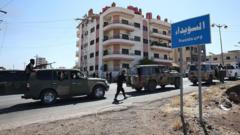Families are torn apart, communities are shattered, and the struggle for survival becomes increasingly desperate as the long-standing conflict in Cameroon continues to escalate. The story of Ngabi Dora Tue, whose husband was brutally murdered by separatists, exemplifies the tragic human cost of this violence, while calls for resolution to the crisis remain largely unanswered.
Struggling Amid Conflict: The Plight of Cameroonians Caught in the Crossfire

Struggling Amid Conflict: The Plight of Cameroonians Caught in the Crossfire
A deepening crisis in Cameroon has led to widespread suffering as citizens face violence from both separatist groups and government forces.
The enduring conflict in Cameroon’s English-speaking regions reveals a grim reality for its citizens, facing dangers from both separatists and government forces. Ngabi Dora Tue's heartbreaking story is a poignant reminder of the loss and suffering that has become commonplace in a country where violence has shattered lives and communities alike.
The tragedy began four years ago when John Mabia, an English-speaking civil servant, was abducted by armed separatist militants during a work trip. The insurgents, fighting for independence in the Anglophone regions of Cameroon, demanded a ransom of over $55,000 for his release, but within days, Dora learned of her husband's brutal killing, which left her grieving and struggling to raise their children alone.
The origins of this conflict date back to the formation of a unified Cameroonian state, which has led to decades of grievances among the English-speaking minority. Many perceive a systematic erosion of their rights by the predominantly Francophone government. In 2016-2017, peaceful protests escalated into violence as security forces cracked down on demonstrators, inviting international criticism of their methods.
To date, the conflict has resulted in at least 6,000 fatalities and the displacement of hundreds of thousands, with five million individuals directly affected. The story is echoed by journalist Blaise Eyong, who lamented the daily fear faced by those living in these regions and the devastation wrought upon communities. Efforts for peace, such as a national dialogue held by the government in 2019, have failed to yield meaningful change.
The situation has also seen infighting among separatist factions, adding layers of complexity to the crisis. New militant groups have emerged, perpetuating violence against both civilians and rival separatists. Eyong noted how education has been severely impacted by the conflict, with nearly half of the schools in the region closed, resulting in a generation of children deprived of learning opportunities.
John, a survivor of torture by government forces, recounted the harrowing details of his experience, which included being coerced into signing documents under duress. His fears reflect common sentiments among the populace regarding the rampant violations experienced under both separatist and government forces.
With a cycle of violence that includes abductions and killings, families are left to grapple with immense loss and trauma. Citizens like Joe, who witnessed horrific acts while in captivity, reveal a landscape filled with despair, with some families still burdened by the trauma of losing loved ones.
Dora's journey speaks to the arduous struggle faced by many in the region. Financial burdens loom large as she navigates life as a widow, forced to confront overwhelming challenges while caring for her children.
Reaction from the Ambazonia Defense Forces hints at the complexities of the crisis, as they distance themselves from the actions of rogue groups that may not represent their leadership, amidst accusations of government infiltrators committing acts of violence.
As the conflict escalates, the humanitarian crisis deepens, calling for urgent international attention and a resolution to restore peace and safety to the afflicted regions of Cameroon. The ongoing plight of individuals like Dora and countless others underscores the human cost of a conflict that has become all too familiar.




















